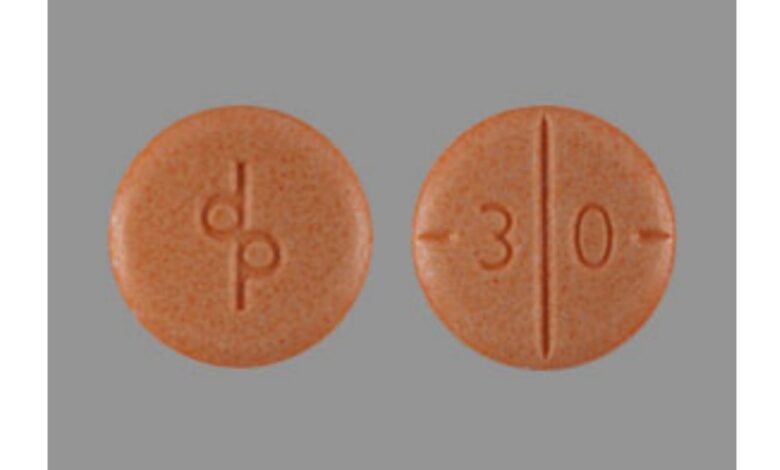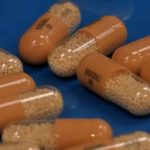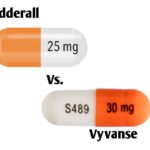Does The Peach Round dp 3 0 Pill Contain Adderall?

The round peach pill with the imprint dp 3 0 has been identified as Adderall 30 mg supplied by Teva Pharmaceuticals USA. Adderall is the trade name for a combination drug containing four salts of amphetamine. The mixture is composed of equal parts racemic amphetamine and dextroamphetamine, which produces a ratio between dextroamphetamine and levoamphetamine, the two enantiomers of amphetamine.
This combination medication is used to treat attention deficit hyperactivity disorder – ADHD. It works by changing the amounts of certain natural substances in the brain. Amphetamine/dextroamphetamine belongs to a class of drugs known as stimulants. It can help increase your ability to pay attention, stay focused on an activity, and control behavior problems. It may also help you to organize your tasks and improve listening skills.
This drug is also used to treat a certain sleeping disorder (narcolepsy) to help you stay awake during the day. It should not be used to treat tiredness or to hold off sleep in people who do not have a sleep disorder. Adderall 30 mg is classified as a Schedule 2 controlled substance under the Controlled Substance Act (CSA).
How should I use dp 30 Adderall?
Read the Medication Guide provided by your pharmacist before you start taking dp 30 Adderall and each time you get a refill. If you have any questions, ask your doctor or pharmacist.
Take this medication by mouth with or without food as directed by your doctor, usually 1 to 3 times a day. The first dose is usually taken when you wake up in the morning. If more doses are prescribed, take them as directed by your doctor, usually 4-6 hours apart. Taking this medication late in the day may cause trouble sleeping (insomnia).
The dosage is based on your medical condition and response to treatment. Your doctor may adjust your dose to find the dose that is best for you. Follow your doctor’s instructions carefully. Use this medication regularly to get the most benefit from it. To help you remember, take it at the same time(s) each day.
What special precautions should I follow?
Before taking dp 30 Adderall pill;
- tell your doctor and pharmacist if you are allergic to amphetamine, other stimulant medications such as benzphetamine, dextroamphetamine (Dexedrine, in Adderall), lisdexamfetamine (Vyvanse), and methamphetamine (Desoxyn); any other medications; or any of the other ingredients in amphetamine products. Ask your pharmacist or check the Medication Guide for a list of the ingredients.
- tell your doctor if you are taking the following medications or have stopped taking them in the past 14 days: monoamine oxidase (MAO) inhibitors including isocarboxazid (Marplan), linezolid (Zyvox), methylene blue, phenelzine (Nardil), selegiline (Eldepryl, Emsam, Zelapar), and tranylcypromine (Parnate). If you stop taking amphetamine, you should wait at least 14 days before you start to take an MAO inhibitor.
- tell your doctor and pharmacist what other prescription and nonprescription medications, vitamins, and herbal products you are taking. Be sure to mention any of the following: acetazolamide (Diamox); ammonium chloride; anticoagulants (‘blood thinners’) such as warfarin (Coumadin, Jantoven); ascorbic acid (Vitamin C); buspirone; medications for heartburn or ulcers such as cimetidine (Tagamet), esomeprazole (Nexium), omeprazole (Prilosec, in Zegerid), and pantoprazole (Protonix); antihistamines (medications for colds and allergies); chlorpromazine; certain diuretics (‘water pills’); fentanyl (Actiq, Duragesic, Subsys, others); guanethidine (Ismelin; no longer available in U.S.); haloperidol (Haldol); medications for high blood pressure; lithium (Lithobid); methenamine salts (Hiprex, Urex); medications for migraine headaches such as almotriptan (Axert), eletriptan (Relpax), frovatriptan (Frova), naratriptan (Amerge), rizatriptan (Maxalt), sumatriptan (Imitrex, in Treximet), and zolmitriptan (Zomig); narcotic pain medications such as meperidine (Demerol) and propoxyphene (Darvon; no longer available in U.S.); quinidine (in Nuedexta); reserpine; ritonavir (Norvir, in Kaletra); medications for seizures such as ethosuximide (Zarontin), phenobarbital, and phenytoin (Dilantin, Phenytek); selective serotonin-reuptake inhibitors such as citalopram (Celexa), escitalopram (Lexapro), fluoxetine (Prozac, Sarafem, in Symbyax), fluvoxamine (Luvox), paroxetine (Brisdelle, Prozac, Pexeva), and sertraline (Zoloft); serotonin and norepinephrine reuptake inhibitors such as desvenlafaxine (Khedezla, Pristiq), duloxetine (Cymbalta), milnacipran (Savella), and venlafaxine (Effexor); sodium acid phosphate; sodium bicarbonate (Arm and Hammer Baking Soda, Soda Mint); tramadol; or tricyclic antidepressants such as desipramine (Norpramin) and protriptyline (Vivactil). Your doctor may need to change the doses of your medications or monitor you carefully for side effects.
- tell your doctor what herbal products you are taking, especially St. John’s wort and tryptophan or nutritional supplements you are taking including glutamic acid (L-glutamine).
- tell your doctor if you have hyperthyroidism (condition in which there is too much thyroid hormone in the body), or strong feelings of anxiety, tension, or agitation. Your doctor will probably tell you not to take amphetamine.
- tell your doctor if anyone in your family has or has ever had an irregular heartbeat or has died suddenly. Also tell your doctor if you have recently had a heart attack or if you have or have ever had a heart defect, arteriosclerosis (hardening of the arteries), coronary artery disease (narrowing of the blood vessels that supply blood to the heart), high blood pressure, an irregular heartbeat, cardiomyopathy (thickening of the heart muscles), heart or blood vessel disease, or other heart problems. Your doctor will examine you to see if your heart and blood vessels are healthy. Your doctor will probably tell you not to take amphetamine if you have a heart condition or if there is a high risk that you may develop a heart condition.
- tell your doctor if you or anyone in your family has or has ever had depression, bipolar disorder (mood that changes from depressed to abnormally excited), mania (frenzied, abnormally excited mood), psychosis, motor tics (repeated uncontrollable movements), verbal tics (repetition of sounds or words that is hard to control), Tourette’s syndrome (a condition characterized by the need to perform repeated motions or to repeat sounds or words), or has thought about or attempted suicide. Also tell your doctor if you have or have ever had seizures, an abnormal electroencephalogram (EEG; a test that measures electrical activity in the brain), or kidney disease.
- tell your doctor if you are pregnant or plan to become pregnant. If you become pregnant while taking amphetamine, call your doctor.
- do not breastfeed while taking amphetamine.
- do not drive a car or operate machinery until you know how this medication affects you.
- do not drink alcohol while you are taking dp 30 Adderall. Alcohol can make the side effects from amphetamine worse.
- you should know that dp 30 Adderall should be used as part of a total treatment program for ADHD, which may include counseling and special education. Make sure to follow all of your doctor’s and/or therapist’s instructions.
- you should know that dp 30 Adderall may cause sudden death in children and teenagers, especially children and teenagers who have heart defects or serious heart problems. This medication also may cause sudden death, heart attack, or stroke in adults, especially adults with heart defects or serious heart problems. Call your doctor or your child’s doctor right away if you or your child has any signs of heart problems while taking this medication including: chest pain, shortness of breath, or fainting.
Is dp 30 Adderall a safe medication?
The medication dp 30 Adderall can be habit-forming. Do not take a larger dose, take it more often, or take it for a longer time than prescribed by your doctor. If you take too much amphetamine, you may continue to feel a need to take large amounts of the medication, and you may experience unusual changes in your behavior. You or your caregiver should tell your doctor immediately, if you experience any of the following symptoms: fast, pounding, or irregular heartbeat; sweating; dilated pupils; abnormally excited mood; restlessness; irratibility; difficulty falling sleeping or staying asleep; hostility; aggression; anxiety; loss of appetite; loss of coordination; uncontrollable movement of a part of the body; flushed skin; vomiting; stomach pain; or thinking about harming or killing oneself or others or planning or trying to do so. Overusing amphetamine may also cause serious heart problems or sudden death.
- Tell your doctor if you or anyone in your family drinks or has ever drunk large amounts of alcohol, uses or has ever used street drugs, or has overused prescription medications. Your doctor will probably not prescribe amphetamine for you.
- Do not stop taking amphetamine without talking to your doctor, especially if you have overused the medication. Your doctor will probably decrease your dose gradually and monitor you carefully during this time. You may develop depression and extreme tiredness. if you suddenly stop taking amphetamine after overusing it.
- Do not sell, give away, or let anyone else take your medication. Selling or giving away amphetamine may harm others and is against the law. Store amphetamine in a safe, preferably locked, place so that no one else can take it accidentally or on purpose. Keep track of how many tablets or how much suspension (liquid) are left so you will know if any are missing.
- Your doctor or pharmacist will give you the manufacturer’s patient information sheet (Medication Guide) when you begin treatment with amphetamine and each time you refill your prescription. Read the information carefully and ask your doctor or pharmacist if you have any questions.
You can also visit the Food and Drug Administration (FDA) website to obtain the Medication Guide.





